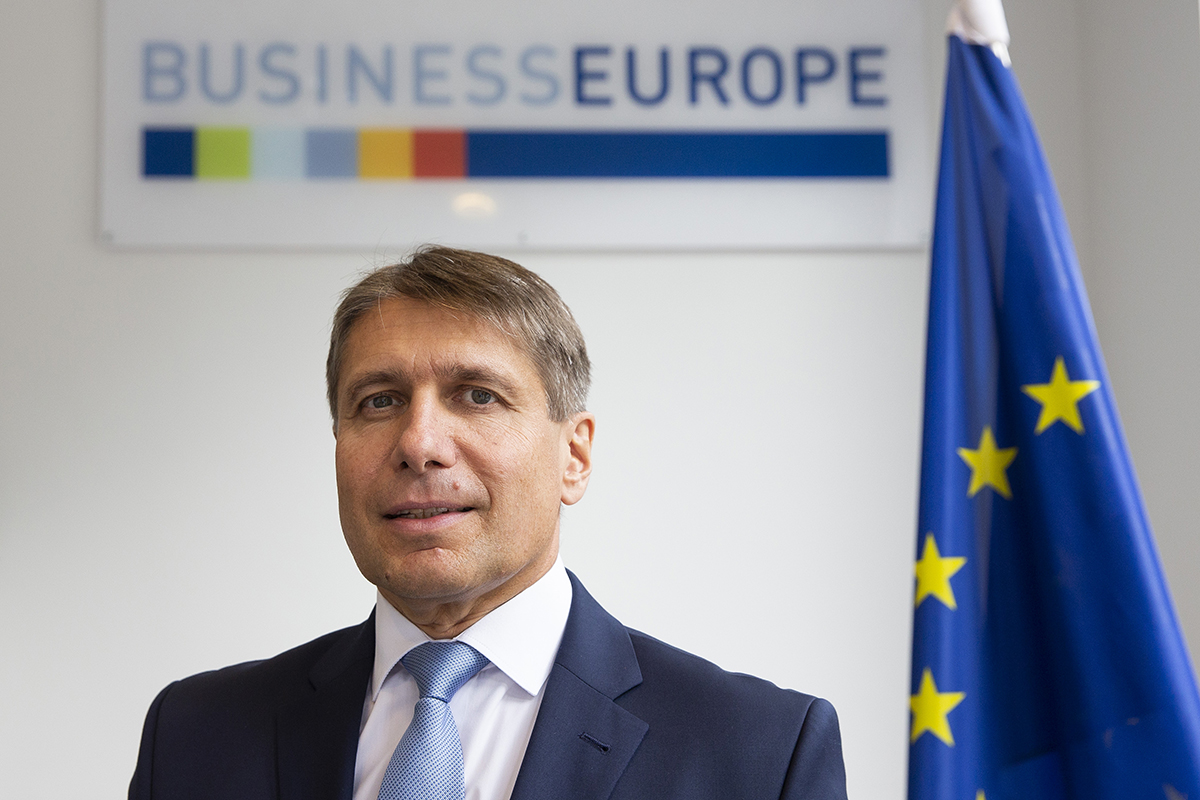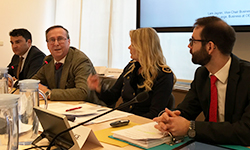BusinessEurope Headlines No. 2020-07
Letter to Competitiveness Council: industry is key in EU’s digital and green ambitions

During the Competitiveness Council taking place in Brussels on 27-28 February, Ministers will exchange their views on the Green Deal and the Single Market Performance Report. They will also adopt a set of the Council conclusions on better regulation as well as advance on the Strategic Innovation Agenda for the European Institute of Innovation and Technology (EIT). BusinessEurope, in its letter to the Council, links the ongoing preparation of the new industrial strategy to the recently published “digital package”, the Green Deal and the Single Market agenda. The letter stresses that it is industry that will drive the artificial intelligence revolution, and it is companies across Europe that are at the core of success of our journey to the sustainable future. An efficient Single Market is one of the key tools to bring necessary technological solutions, and BusinessEurope points to some concrete steps that the Council could make in a few coming months, such as addressing bottlenecks in the European standardisation policy.
![]() Contact: Martynas Barysas
Contact: Martynas Barysas
How to leverage more European private investment abroad?
 The seminar “Innovative Financing Instruments to Support European Private Investment in Third Countries”, organised by BusinessEurope on 25 February, gathered stakeholders to discuss a topic of growing interest: blended finance. The volume of investments required to meet the Sustainable Development Goals at a global level are substantial and well exceed available public resources, causing many to look towards the private sector to fill the funding gap. The seminar aimed to provide business representatives with a theoretical framework on blending and its best practices, as well as to increase awareness and understanding of financing instruments currently available to firms wishing to invest in third countries. BusinessEurope welcomed speakers from the Organisation for Economic Co-operation and Development, the Association of European Development Finance Institutions, the European Investment Bank, the Directorate-General for International Cooperation and Development of the European Commission, the Spanish development agency AECID, the World Bank and European Bank for Reconstruction and Development. This seminar initiated a discussion on an increasingly important topic, which BusinessEurope will explore further in a position paper to be published in the coming months.
The seminar “Innovative Financing Instruments to Support European Private Investment in Third Countries”, organised by BusinessEurope on 25 February, gathered stakeholders to discuss a topic of growing interest: blended finance. The volume of investments required to meet the Sustainable Development Goals at a global level are substantial and well exceed available public resources, causing many to look towards the private sector to fill the funding gap. The seminar aimed to provide business representatives with a theoretical framework on blending and its best practices, as well as to increase awareness and understanding of financing instruments currently available to firms wishing to invest in third countries. BusinessEurope welcomed speakers from the Organisation for Economic Co-operation and Development, the Association of European Development Finance Institutions, the European Investment Bank, the Directorate-General for International Cooperation and Development of the European Commission, the Spanish development agency AECID, the World Bank and European Bank for Reconstruction and Development. This seminar initiated a discussion on an increasingly important topic, which BusinessEurope will explore further in a position paper to be published in the coming months.
Contact: Benedikt Wiedenhofer
EU SME strategy: opportunity to support 25 million SMEs
 Building on the achievements of the Small Business Act, the new EU SME strategy should take account of the new needs of SMEs, for example in the green transition and the digital transformation. The strategy should be based on a set of result-oriented principles, be driven by a clear, structured and effective governance monitoring its concrete implementation both at the European and national level and ensure that all growth-related EU strategies include clear aims in terms of promoting SME growth. This was the key message of the Chair of BusinessEurope’s Entrepreneurship and SME Committee Anna-Lena Bohm during an exchange of views with the Vice-Chair for SMEs and Entrepreneurship at Business at OECD (BIAC), Lars Jagrén. BusinessEurope's Committee met with OECD-BIAC to exchange views on some of the most topical issues for SMEs a few weeks before the European Commission publishes a new SME strategy. BusinessEurope recently published a set of 50 actions which we trust will make this strategy work. The actions cover key areas such as better regulation, single market, internationalisation, sustainability and circular economy, digital transformation, innovation, access to finance and skills.
Building on the achievements of the Small Business Act, the new EU SME strategy should take account of the new needs of SMEs, for example in the green transition and the digital transformation. The strategy should be based on a set of result-oriented principles, be driven by a clear, structured and effective governance monitoring its concrete implementation both at the European and national level and ensure that all growth-related EU strategies include clear aims in terms of promoting SME growth. This was the key message of the Chair of BusinessEurope’s Entrepreneurship and SME Committee Anna-Lena Bohm during an exchange of views with the Vice-Chair for SMEs and Entrepreneurship at Business at OECD (BIAC), Lars Jagrén. BusinessEurope's Committee met with OECD-BIAC to exchange views on some of the most topical issues for SMEs a few weeks before the European Commission publishes a new SME strategy. BusinessEurope recently published a set of 50 actions which we trust will make this strategy work. The actions cover key areas such as better regulation, single market, internationalisation, sustainability and circular economy, digital transformation, innovation, access to finance and skills.
![]() Contact: Daniele Olivieri
Contact: Daniele Olivieri
Business has strong role to play in WTO reform process
 At a seminar jointly organised by the Mission of Canada to the EU and the European Centre for International Political Economy (ECIPE) on 20 February, Sofia Bournou, Senior Adviser, shared BusinessEurope’s perspective on the role of business in the reform process in the World Trade Organisation (WTO). Currently, the WTO finds itself entangled in a profound crisis, which is particularly noticeable in the negotiating functioning of the organisation – its inability to develop new multilateral rules – as well as in its dispute settlement pillar – as the Appellate Body is, since December 2019, unable to function. There is wide recognition of the need to reform the WTO. What is the role of business in this regard? “The WTO is not something theoretical for companies as they use its rules to trade globally. It also provides stability and predictability. As everybody abides by the same rules, the WTO ensures that multilateral trade is not subject to the volition of most powerful over the less powerful”, Bournou stated. She added that business calls on WTO members to pursue an ambitious agenda to update the WTO’s rulebook in areas such as industrial subsidies or e-commerce. In parallel, members should also work on the reform of the WTO, by finding solutions to the Appellate Body crisis or by looking at the question of special and differential treatment for developing countries. “These are mutually reinforcing processes”, she highlighted. As preparations for the 12th WTO Ministerial Conference taking place in June, in Nur-Sultan, intensify, European business invites WTO members to consider ways to engage further with business and other stakeholders.
At a seminar jointly organised by the Mission of Canada to the EU and the European Centre for International Political Economy (ECIPE) on 20 February, Sofia Bournou, Senior Adviser, shared BusinessEurope’s perspective on the role of business in the reform process in the World Trade Organisation (WTO). Currently, the WTO finds itself entangled in a profound crisis, which is particularly noticeable in the negotiating functioning of the organisation – its inability to develop new multilateral rules – as well as in its dispute settlement pillar – as the Appellate Body is, since December 2019, unable to function. There is wide recognition of the need to reform the WTO. What is the role of business in this regard? “The WTO is not something theoretical for companies as they use its rules to trade globally. It also provides stability and predictability. As everybody abides by the same rules, the WTO ensures that multilateral trade is not subject to the volition of most powerful over the less powerful”, Bournou stated. She added that business calls on WTO members to pursue an ambitious agenda to update the WTO’s rulebook in areas such as industrial subsidies or e-commerce. In parallel, members should also work on the reform of the WTO, by finding solutions to the Appellate Body crisis or by looking at the question of special and differential treatment for developing countries. “These are mutually reinforcing processes”, she highlighted. As preparations for the 12th WTO Ministerial Conference taking place in June, in Nur-Sultan, intensify, European business invites WTO members to consider ways to engage further with business and other stakeholders.
Contact: Sofia Bournou
Calendar 
- 4 March: European Climate Law
- 4 March: Africa strategy
- 4-5 March: Gender Equality Package
- 5 March: BusinessEurope Day 2020: Prosperity, People, Planet (livestream)
- 5 March: Environment Council
Reminder: please have a look at our privacy policy